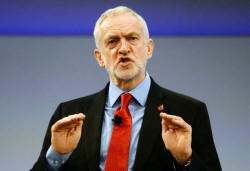British Labour leader Corbyn tells Morgan Stanley:
'We're a threat'
 Send a link to a friend
Send a link to a friend
 [December 01, 2017]
By Guy Faulconbridge [December 01, 2017]
By Guy Faulconbridge
LONDON (Reuters) - Britain's opposition
Labour leader Jeremy Corbyn warned Morgan Stanley that bankers are right
to regard him as a threat because he wants to transform what he cast as
a rigged economy that profits speculators at the expense of ordinary
people.
Morgan Stanley cautioned investors on Nov. 26 that political uncertainty
in Britain was a bigger threat than Brexit given the risk of Corbyn
winning power and then dismantling what was once seen as one of the
world's most stable free-market economies.
"Bankers like Morgan Stanley should not run our country but they think
they do," Corbyn, a 68-year-old socialist, said in a video posted on
Twitter that showed the towers of the City of London and Canary Wharf
financial districts.
"So when they say we're a threat, they're right: We're a threat to a
damaging and failed system that is rigged for the few," he said.
Morgan Stanley declined to comment.

London, which vies with New York for the title of the world’s financial
capital, dominates the $5.1-trillion-a-day global foreign exchange
market and is home to more banks than any other financial center.
But many bankers, CEOs and investors were spooked by the shock 2016 vote
for Brexit and have been dismayed by the political turmoil which
followed, including Prime Minister Theresa May's botched gamble on a
snap election in June.
May lost her party its majority in parliament in that election while
Corbyn's unexpectedly strong result in the vote has convinced many of
Labour's opponents that Corbyn is a potential prime minister if May's
government falls.
"CUBA WITHOUT THE SUN"
Kept in power with the support of a small Northern Irish political
party, May has just over a year to negotiate Britain's divorce from the
EU that will shape Britain's prosperity and global influence for
generations to come.
Now many investors fear Corbyn, who was once dismissed by his own party
as an out-of-touch peace campaigner with no hope of ever winning power,
could win the top job if the political turmoil continues in London.
One senior executive at a top U.S. investment bank said that at a
meeting in New York recently concerns over Corbyn trumped concerns about
Brexit.
"Their top concern was not what's happening in Germany and Spain, or
North Korea and Trump: their main concern was what's happening in the UK
and what Corbyn might mean for the country," the executive, who spoke on
condition of anonymity said.
"It's like Cuba without the sun," the executive said.
Morgan Stanley said Britain now faced a "double whammy" of uncertainty
from Brexit and the domestic political instability.


[to top of second column] |

Jeremy Corbyn, the
leader of Britain's opposition Labour Party speaks at the
Conferederation of British Industry's annual conference in London,
Britain, November 6, 2017. REUTERS/Mary Turner/File Photo

"From a UK investor perspective, we believe that the domestic political
situation is at least as significant as Brexit," Morgan Stanley analysts said in
a note to clients.
Morgan Stanley said there was a high likelihood of another national election in
late 2018 -- just months before Britain is due to leave the EU on March 29 2019.
The bank's analysts said a Labour victory could mark the biggest shift in
British politics since the late 1970s when Margaret Thatcher won victory,
started to privatize chunks of the economy and opened up London to U.S. and
Japanese banks.
"It is certainly plausible that the Labour Party could ultimately moderate some
of its more radical policy ideas; the alternative could be the most significant
political shift in the UK since the end of the 1970s," Morgan Stanley said.
"SPECULATORS AND GAMBLERS"
Corbyn has cast bankers as the villains behind the 2008 financial crisis and has
promised to increase taxes on the banks and investment funds which trade out of
London, including their staff through higher income taxes.
Corbyn, who has promised sweeping renationalisation, higher public spending and
tax rises for the rich, said banks like Morgan Stanley were speculators who had
left ordinary people to pay the price for their greed.

"These are the same speculators and gamblers who crashed our economy in 2008 and
then we had to bail them out," Corbyn said. "Their greed plunged the world into
crisis and we're still paying the price."
Corbyn said Morgan Stanley CEO James Gorman earned tens of millions personally
and banks paid out billions of pounds worth of bonuses while Labour was the
party of the people and a government in waiting.
Such "banker bashing" could be popular with some voters in Britain where
financiers are often portrayed as vastly overpaid. Financial services
contributed 11.5 percent of total UK government tax receipts in 2016.
Corbyn's Labour won 40 percent of the votes cast in June 2017 while May's
Conservatives won 42 percent.
Morgan Stanley, which opened on Wall Street in 1935, set up its European
headquarters in London in 1977 and it now has over 5,000 staff, most at a block
in Canary Wharf. Morgan Stanley did not receive a British government bailout
during the 2008 crisis.
(Additional reporting by Anjuli Davies in London and Stephen Jewkes in Milan;
Editing by William Maclean and Angus MacSwan)
[© 2017 Thomson Reuters. All rights
reserved.] Copyright 2017 Reuters. All rights reserved. This material may not be published,
broadcast, rewritten or redistributed. |